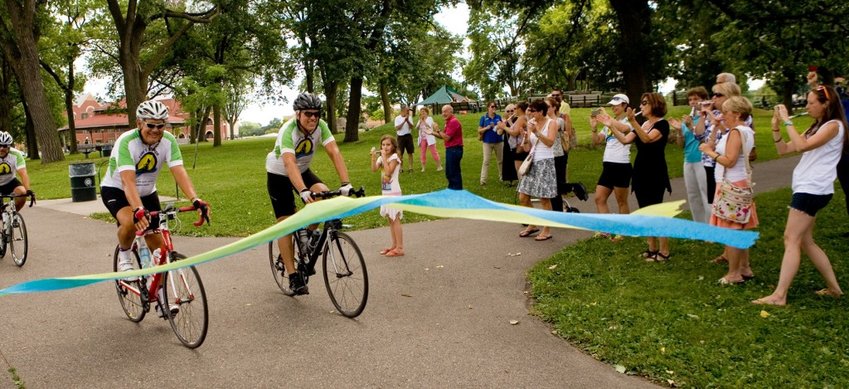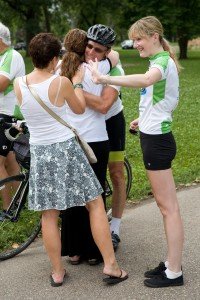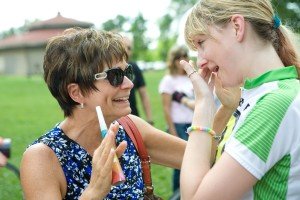 Photo above: Members of Tom’s Big Ride sprint across the finish line at Minnehaha Park on Day 31, which happened to be Tom’s 60th birthday.
Photo above: Members of Tom’s Big Ride sprint across the finish line at Minnehaha Park on Day 31, which happened to be Tom’s 60th birthday.
Article and photos by MARGIE O’LOUGHLIN
Tom Mork is a self-described middle-aged banker from Lakeville—just an ordinary guy. But when he arrived at Minnehaha Park to celebrate his 60th birthday on Fri., Aug. 7, the event was anything but ordinary.
Mork biked into the Wabun Picnic Area with a couple dozen friends and family, all clad in spandex shirts sporting, “Tom’s Big Ride” across their chests. The team had left Winona that morning on Day 31 of a cross-country bike adventure that began in Venice, Louisiana on July 6.
After a brief lay-over in Minneapolis, Tom’s Big Ride ended at the headwaters of the Mississippi River in Itasca State Park on August 13. On that 39th day, the team completed their 2,100 mile ride to benefit the National Alliance on Mental Illness of Minnesota (NAMI) and riding south to north—as they did—they rode it all uphill.
The choice of direction was significant. “Every day with a mental illness is an uphill battle. By comparison, our climb was insignificant,” Mork commented.
 It took more than two years of planning and fundraising to pull off this adventure. Before the riders even dipped their tires in the Gulf of Mexico (a biker’s ritual), $95,000 was already pledged to NAMI. By the time they pulled into Minnehaha Park, another $9,000 had been raised.
It took more than two years of planning and fundraising to pull off this adventure. Before the riders even dipped their tires in the Gulf of Mexico (a biker’s ritual), $95,000 was already pledged to NAMI. By the time they pulled into Minnehaha Park, another $9,000 had been raised.
Photo left: Tom Mork, the creator of Tom’s Big Ride, embraced (l to r) his daughter Jen, wife Jean and daughter Christine.
Mork has more than a passing interest in the work of NAMI. He and his wife Jean nearly lost their daughter, Christine, to what was eventually diagnosed as bi-polar disorder. According to her older sister, Jen Lewis, “Christine was a young woman living in California in 2010, and experienced a psychiatric breakdown during a really tough time.” The family tried to help her but, like many families confronted and surprised by mental illness, they just didn’t know what to do.
Eventually Christine moved back to Minnesota, and her family learned about the resources NAMI offered. Located at 800 Transfer Rd. in St. Paul, NAMI is dedicated to improving the lives of children and adults with mental illness, and their families. NAMI enthusiastically promotes the development of community mental health services, works to end stigmatization and discrimination, and strives to increase public awareness and understanding of what mental illness is.
Mork and his family have learned the hard way what mental illness is. For starters, it’s real; it doesn’t just affect other people; and it can happen even in the nicest of families. Tom, Jean, Jen and Christine agreed, as a family, that it was worth taking up a whole lot of their time and energy to start talking about it.
 Photo right: Patty McDonald (pictured at left) is Christine’s employer and staunch supporter.
Photo right: Patty McDonald (pictured at left) is Christine’s employer and staunch supporter.
Sue Abderholden is the executive director of NAMI, and a Longfellow resident. She said, “This is the definitive no-hotdish illness. By that I mean, when you struggle with a mental illness, there aren’t usually special meals left at your door or get well cards. What we try to provide at NAMI is education, hope for recovery and empathy.”
Last year NAMI presented 75 classes to over 1,200 family members, held 60+ support groups across the state for individuals living with mental illness, answered 4,000+ helpline calls, and much more. Every one of their services is offered free of charge, and classes and support groups meet in locations throughout the Twin Cities.
In “Family to Family,” a 12 week class offered regularly at NAMI, participants learn about the many types of mental illness, how to find resources, build communication skills, reduce stress and get support. In a sense, they learn to go to the source of the problem—much like Mork and his fellow bikers went to the source of the Mississippi River.
For more information about NAMI, visit www.namihelps.org.
“Mental illness affects almost everyone directly or indirectly,” Abderholden said. “Nearly 100% of our board and staff at NAMI are either dealing with a mental health issue themselves or with someone in their immediate family. What Tom Mork is doing is breaking down barriers. With his willingness to be transparent, he’s inviting everyone he meets to end their silence around mental illness.”
That’s the first of many steps toward healing.
Comments
No comments on this item Please log in to comment by clicking here